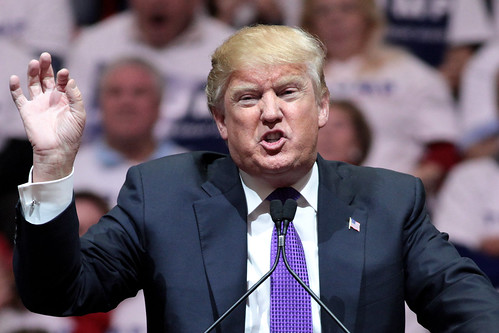From Smirking Chimp
Trump just can't get things done, and we need to stop having conversations predicated on the assumption that maybe he can. His dangerous incompetence is currently risking war in the Middle East and Asia, while pitting American against American in ways we haven't seen in this country since the days of George Wallace.
For example, while citizens and leaders of the western world try to figure out what happened in Helsinki, Trump supporters are in plaintive wail mode: "He just wants better relations with Russia," they say. "What's wrong with that?"
In a previous op-ed, I posited three possible reasons for Donald Trump's behavior relative to Russia: that he's a witting or unwitting stooge, a wannabe dictator, or desperately broke. Several people noted, in comments to the article, that I'd missed a fourth option: "He's trying for world peace. Wouldn't better U.S./Russia relations be a good thing for the U.S. and world peace?"
Of course, it would be a good thing if the U.S. and Russia could get along better. It would be a very good thing.
Relations have been badly strained with Russia ever since we first started pushing NATO onto her borders (in ways that Reagan/Bush had promised Gorbachev would never happen if he'd let the USSR dissolve), and Russia (in part, citing those broken promises) intervened in Georgia, Crimea, and Ukraine.
But Donald Trump is never going to untangle that mess: He simply lacks the skills, and isn't willing to turn details over to underlings who are competent. Instead, in Bolton and Pompeo, he has selected "hawks" historically hostile to Russia, which may be why he went out of his way to exclude them from his talks in Helsinki. It says a lot when a president is so incompetent he can't even appoint advisers who agree with his worldview.
He just can't do things competently.
This pattern has repeated almost daily since the election: consider how his other promises and actions reveal his distressing lack of competence and his failure to understand even the most basic elements of statesmanship and governance.
Donald Trump was elected on an "outsider" platform that, in significant ways, mirrored that of Bernie Sanders and progressive Democrats, earning him large swaths of former Obama voters. But his incompetence has betrayed them, and every world leader, looking on, now knows exactly what they're dealing with and won't be suckered the way working-class Americans were in November of 2016.
On entitlements, for example, Trump famously stood on the stage on April 18, 2015 (and multiple other occasions), and said, "Every Republican wants to do a big number on Social Security, they want to do it on Medicare, they want to do it on Medicaid, and we can't do that and it's not fair to the people that have been paying in for years and now, all of a sudden, they wanna be cutting it." (Bernie, of course, didn't believe him for a second and called him out.)
He can't do it on entitlements.
On trade, Trump took the position of the Congressional Progressive Caucus -- and every U.S. administration from George Washington to Jimmy Carter -- when he said he would protect U.S. jobs (and bring home manufacturing jobs) with the use of targeted tariffs. The last time we had a substantive national discussion of the issue was when Ross Perot challenged Bill Clinton and George H.W. Bush for the presidency in 1992, and won over 20 percent of the national vote (correctly) warning of that "giant sucking sound from the south" that would happen if the U.S. signed NAFTA and joined the GATT/WTO.
Most Americans then, and most now, supported targeted tariffs. But Trump's all over the map, doling out exceptions to tariffs and trade rules when it suits his business interests or when he gets hassled by his wealthy Republican constituency.
Even worse, companies must operate over decades-long periods when planning to invest millions or billions into new manufacturing facilities -- but because Trump is doing what he is by executive actions (with a "national security" excuse that will probably be struck down in the courts) instead of moving comprehensive trade legislation through Congress, no company has the assurance that his protective tariffs won't simply evaporate the day he leaves office.
(Note: You can view every article as one long page if you sign up as an Advocate Member, or higher).






